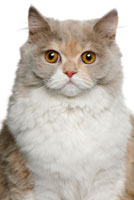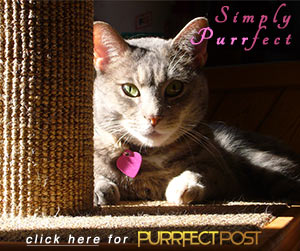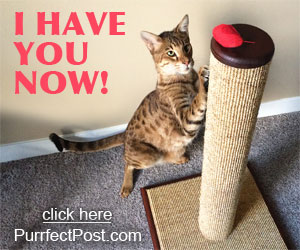Cat Diarrhea

Diarrhea is an increased fluid level in the stool, and it's often accompanied by a higher stool volumes and frequency of defecation, as well.
As a cat lover, you probably know what this means. Soft, stinky bowel movements adorning the litter pan—or worse, your carpet. The bad news: diarrhea is a common condition in cats. Food changes, infections, or prescribed antibiotics are common causes of runny feline stool. The good news: most cases of cat diarrhea are mild and self-limiting. Some knowledge of the causes and treatment of diarrhea can help you be prepared if it ever strikes your feline pal.
Veterinarians typically classify diarrhea based on its duration, anatomic location, and severity. These characteristics can help narrow down the possible causes.
Acute Versus Chronic Diarrhea in Cats
Acute diarrhea is quite a common occurrence in cats. It has a fairly sudden onset and lasts a week or less. The most frequently seen causes of acute diarrhea in cats include dietary intolerance, viral infections, and intestinal parasites. An abrupt diet change can easily give a kitty the runs. So can dairy products because, contrary to popular opinion, many cats are lactose intolerant. Because a cat's emotions can easily translate into physical problems, a stressful event such as a change in your schedule or a move to a new home can trigger diarrhea.
Diarrhea is considered chronic if it persists for three weeks or longer despite treatment or repeatedly recurs over time. Chronic diarrhea can be associated with certain parasites, food allergies, inflammatory bowel disease, pancreatic disorders, and systemic conditions such as hyperthyroidism.
Small Versus Large Intestinal Diarrhea in Cats
The type of signs your cat is having can pinpoint the problem area in his body. Diarrhea that originates from the small, or upper, intestine is typically soft to liquid, foul-smelling, fairly voluminous, and variable in color. You may notice that your kitty is extra gassy. Small intestinal diarrhea would not be expected to contain frank (readily apparent) blood. A food allergy, pancreatic insufficiency, and inflammatory bowel disease are common afflictions of the upper small intestine. A cat that is afflicted with hyperthyroidism can present with small intestinal diarrhea.
Warning:
If you notice your cat showing discomfort in the litter pan, always take a moment to determine whether urine or feces are still being produced. A urinary blockage can be life-threatening in male cats. If in doubt, consult your veterinarian immediately.
Diarrhea that originates from the large, or lower, intestine is a different matter. Cats with colitis (large intestinal diarrhea) are plagued by frequent and sudden urges to defecate. The diarrhea may be liquid and explosive, coming out in small bursts. There may be streaks of blood or mucus in the stool. Your cat may strain to defecate, with only a few drips of stool coming out. It's not uncommon for cats to vomit in the litterbox from the force of their straining when they are dealing with large intestinal diarrhea. Once finished, your cat may seem agitated and go tearing around the house as if being chased.
Common causes of colitis include the protozoal infection giardia, other parasites, and inflammatory bowel disease.
Note that cats can exhibit classic colitis signs and actually be constipated. Your veterinarian can usually determine whether this is the case during a physical exam.
Mild Versus Complicated Feline Diarrhea
Many cases of feline diarrhea are mild and self-limiting. They respond well to simple treatment and home care. Other times, diarrhea can be part of a more complex medical condition. Fluid loss from diarrhea of any cause, especially when it's accompanied by vomiting, can rapidly lead to dehydration and carry serious health consequences. This is especially true in kittens and older cats. Chronic disorders of the small intestine typically cause weight loss and malnutrition as time wears on. Some forms of acute diarrhea can be life-threatening and require aggressive intervention. These include feline distemper (panleukopenia), intoxications, and intestinal obstructions.
What to Do If Your Cat Has Diarrhea
Diarrhea is a nuisance at best. At its worst, it can be life-threatening. Contact your veterinarian right away if your cat's diarrhea:
- is accompanied by repeated vomiting, lethargy, loss of appetite, abdominal pain, generalized weakness, or fever.
- contains large amounts of frank blood.
- is black or tarry in color.
- might be related to ingesting something toxic.
- occurs in a kitten under nine months of age, particularly if vaccines were missed.
- occurs in an elderly or medically frail animal.
- fails to respond or gets worse despite 48 hours of symptomatic home care.
Causes of Kitty Diarrhea (Partial List)
Dietary Diarrhea
Parasites
Viruses
Bacteria
Fungal
|
Systemic diseases
Inflammatory
Anomalous
Toxicity
|
When healthy adult cats get a simple case of diarrhea, it's often reasonable to try treating them at home. When in doubt, consult your veterinarian.
If you've recently changed your cat's food, stop the new diet. Changing back to the old food for a few days can solve the problem. Otherwise, try feeding small, frequent meals of simple, easily digested food such as low-fat chicken or beef, which can be pureed in a blender with water or chicken broth to yield a good consistency. Consider adding a probiotic such as lactobacillus, the "good bacteria" found in yogurt. Fortiflora is an excellent source of live, active probiotic cultures. Unflavored canned pumpkin, which is full of fiber, is a great way to firm up stools and has a taste that many cats like. One to two level tablespoons per 5.5 oz. can of cat food is a good starting dose.
Feed the sick diet until 48 hours past the resolution of diarrhea. Then slowly reintroduce a healthy maintenance diet over the next few days, taking care to avoid any pet foods or treats that may have triggered the problem in the first place.
Never give any medications, including over-the-counter human medications, to your cat unless under strict instructions by your veterinarian. Common over-the-counter remedies such as Pepto-Bismol and Imodium, while safe for you, can be toxic for your cat. Inappropriate use of people medicine can make pets very sick.
If Your Cat Ends up at the Veterinarian's Office
You can help by giving a thorough history. Be prepared with answers to the following questions:
- When was the onset and how long as the diarrhea been going on?
- How many times per day does your cat have diarrhea?
- Do you notice an increased urgency, stool accidents outside the litterbox, or straining to defecate?
- Have you seen blood or mucus in the feces?
- What is your cat's dietary history, including recent diet changes and treats?
- What treatments, if any, has the cat been given, and how did they work?
- Are there any other signs of illness, including vomiting, lethargy, or appetite loss?
- Does your cat go outside?
- Has there been any exposure to other animals that may have been sick?
- Has your cat experienced any recent stressful events?
- What is the current and past vaccination status of your cat?
Your veterinarian will then conduct a full physical examination on your cat, checking especially for signs of dehydration, anemia, abdominal pain, intestinal irregularities, fever, and weight loss. Your vet will most likely want to run a fecal analysis for parasites, so don't forget to bring a fresh stool sample if one is available.
In simple diarrhea cases, the plan is usually straightforward. Your vet is likely to prescribe a special diet and/or medication, along with a dewormer if one is indicated. Sicker cats will need more involved workups such as lab work, x-rays, specialized imaging, and fecal tests. Very sick kitties may need to be admitted to the hospital for IV (intravenous) fluids and intensive medical treatment. Some chronic diarrhea cases are ultimately managed through food and medication trials. A definitive diagnosis may require surgery or biopsy.
Sources and Further Reading:
- "Diseases of the intestines." In Leib MS, Monroe WE (eds.). Practical Small Animal Internal Medicine. Philadelphia: WB Saunders, 1997.
- Sherding, RG & Johnson, SE. "Diseases of the Intestines." In Birchard, SJ & Sherding, RG (eds.). Saunders Manual of Small Animal Practice. Philadelphia: W.B. Saunders, 2000.
You May Also Like These Articles:
Why Does My Cat's Rear End Smell Bad?
Inappropriate Urination in Cats
Foods Toxic to Cats - Slideshow
Inflammatory Bowel Disease in Cats
Cats and Chocolate: Why is Chocolate Bad for Cats?




